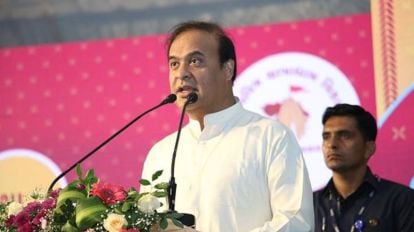Assam CM Himanta Biswa Sarma Declares Firm Stance Against 'Miya' Muslims, Sparks Controversy in State Assembly

Assam CM Himanta Biswa Sarma Declares Firm Stance Against ‘Miya’ Muslims, Sparks Controversy in State Assembly
Date: August 27, 2024
Location: Guwahati, Assam
Introduction: Assam Chief Minister Himanta Biswa Sarma sparked significant controversy on August 26, 2024, during a heated discussion in the state legislative assembly. Sarma, known for his outspoken and often polarizing remarks, declared that he would not allow ‘Miya’ Muslims to take over Assam, emphasizing his commitment to protecting the cultural identity of the state. His comments were met with strong reactions from opposition parties, leading to a fiery debate.
Details of the Assembly Session: The contentious remarks were made during the discussion of adjournment motions moved by the opposition parties, including the Congress and All India United Democratic Front (AIUDF). These motions aimed to address various issues, including communal harmony and the rights of minority communities in Assam.
In his response, Sarma did not mince words. “I will take sides. What can you do about it?” he asked, directly addressing the opposition members who had accused his government of discrimination against certain communities. Sarma’s use of the term ‘Miya’ Muslims, which colloquially refers to Bengali-speaking Muslims, further intensified the debate. He argued that his administration’s policies were focused on safeguarding the indigenous people of Assam and their cultural heritage.
Context and Background: Himanta Biswa Sarma has a history of making provocative statements concerning the demographic and cultural dynamics of Assam. His government has been accused of targeting the ‘Miya’ Muslim community, which is perceived by some as a threat to the indigenous Assamese culture. The term ‘Miya’ itself has been a subject of controversy, as it is often used pejoratively to refer to Bengali-speaking Muslims, many of whom are descendants of immigrants from present-day Bangladesh.
Sarma has repeatedly emphasized the importance of protecting Assam’s identity, which he believes is under threat due to illegal immigration and changing demographics. His government has implemented several policies aimed at curbing illegal immigration and promoting the interests of the indigenous population. These policies have included eviction drives in areas with a high concentration of ‘Miya’ Muslims, which the opposition and human rights groups have criticized as discriminatory.
Opposition’s Reaction: Opposition leaders condemned Sarma’s remarks, accusing him of communalizing the issue and fostering divisions within the state. Congress leader Debabrata Saikia stated that the Chief Minister’s comments were “irresponsible and unbecoming of a leader of his stature.” He added that such statements could further polarize the state’s population and exacerbate communal tensions.
AIUDF leader Badruddin Ajmal also criticized Sarma, saying that the Chief Minister was “playing with fire” by making such divisive comments. Ajmal warned that Sarma’s rhetoric could lead to unrest and undermine the state’s social fabric. The opposition parties demanded that Sarma retract his statement and issue an apology, but the Chief Minister remained defiant.
Public and Political Reactions: Sarma’s remarks have elicited mixed reactions from the public and political commentators. Supporters of the Chief Minister argue that he is merely voicing the concerns of the indigenous Assamese population, who feel threatened by demographic changes in the state. They believe that Sarma’s tough stance is necessary to protect Assam’s cultural identity.
On the other hand, critics argue that the Chief Minister’s rhetoric is divisive and could lead to communal strife. They accuse Sarma of using the ‘Miya’ Muslim community as a scapegoat for political gains and warn that such statements could have serious repercussions for the state’s peace and stability.